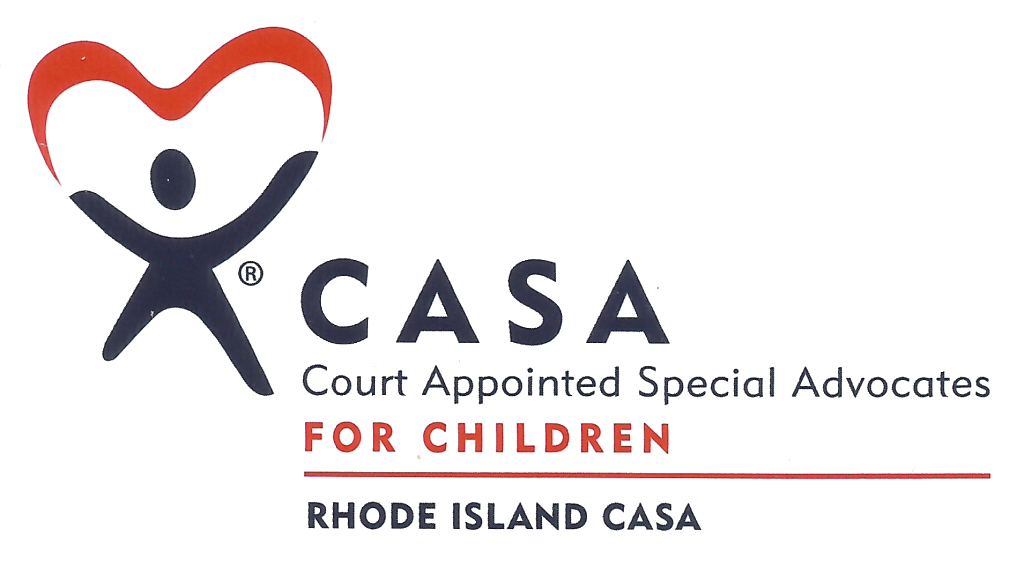
Support Rhode Island's Children
Make a Difference Today!
Volunteer Info:
Are you an adult over age 21 who would like to give a voice to abused and neglected children who are in DCYF care? Right now, there are hundreds of Rhode Island children who need the steady presence and strong voice of a volunteer Court Appointed Special Advocate (CASA).
RI CASA was established by the Family Court in 1978 to provide dedicated advocates for abused, neglected and/or dependent children who become involved in the child welfare system through no fault of their own. Trained volunteer advocates work with CASA staff attorneys and social workers to promote the best interests of Rhode Island’s most vulnerable kids. CASA strives to ensure that children don’t “fall through the cracks” of a system that was put in place to help them.
Volunteer advocates visit regularly with children in their cases, gather information, provide brief reports about their assigned children to the Court, and often become the only consistent adults in the children's lives. Volunteer candidates must possess a valid driver’s license, concern for the welfare of children, good judgment, and effective communication skills. All undergo background checks and personal interviews before completing a 30-hour training program with court observation.
According to the National CASA Association, a child served by a volunteer advocate is more likely to be adopted, half as likely to re-enter foster care, less likely to spend time in long-term foster care, and more likely to do well in school.
The Rhode Island Court Appointed Special Advocates for Children Program (RI CASA) accepts applications on a rolling basis for the five volunteer training classes that are scheduled throughout the year:
January and June in the Kent County Courthouse (222 Quaker Lane, Warwick)
- March, September, and October at the Garrahy Judicial Complex (One Dorrance Plaza, Providence)
Give a child a voice! For more information, call (401) 822-6722 or (401) 458-3239.
Volunteer application packets can be downloaded here!
Do I Qualify?
Volunteer Court Appointed Special Advocate (VCASA)
Desire to help abused and neglected children maintain stability and permanency
Must be 21 years of age and a United States citizen
Have a valid driver’s license
Be willing to travel throughout the state on CASA related business
Ability to maintain objectivity when gathering information
Effective communication and writing skills essential for the preparation of Court reports
Ability to work independently
Responsible to Staff Attorney and Staff Social Caseworker
Volunteer Training Topics:
Overview of the CASA Volunteer Role/The RI Child Protection System
Offers a broad view of the course agenda. Covers the roles and responsibilities of the CASA volunteer. Provides an historical view of the child protection system, the importance of confidentiality, information about how cases of abuse and neglect come to the attention of RI DCYF (RI Department for Children, Youth and Families) and track through the RI DCYF system. It also includes a general overview of how CASA and RIDCYF interact.
Introducing the Law
Provides a general overview of the Family Court system and the child protective court process. The activities are designed to help the participants become more comfortable with the courtroom process and experience.
Family Systems and Development
Focuses on family dynamics and discusses risk factors (including substance abuse, domestic violence and mental illness), the impact of poverty, parental substance abuse and domestic violence on children. How these factors influence the ways a family copes with change, crisis and stress. The bond children have with their families. Activities in this chapter help the CASA volunteer recognize personal values and maintain objectivity regarding the risks for a child. This chapter also helps the participants focus on the feelings and fears of the children for whom they will advocate.
Communicating and Interviewing Skills for CASA Volunteers
Names the basic elements of communication, recognizes the importance of observation in gathering information about children and identifies the elements of a successful child interview, reviews important skills for building rapport and trust with a child, applies a collaborative approach to dealing with conflict, identifies different styles of dealing with conflict and revisits the concept of confidentiality.
Exploring Cultural Awareness
Examines the dynamics of cultural differences. Participants examine values and how values determine how a culture meets and defines basic needs. Participants will identify their own values and relate them to those of other cultures. Activities will give participants the opportunity to identify how language, class, and culturally bound values influence the recommendations concerning the child. Participants are encouraged to gain competence in working cross culturally, identifying ways to become more sensitive to cultural diversity.
Practicing the CASA Volunteer Role – Working a Case
Reviews the process used to appoint a CASA volunteer to a case, creates and implements a strategy to gather information about a case, identifies the components of a successful interview and names community resources that might be effective in addressing the needs of a child.
Practicing the CASA Volunteer Role – Report Writing
Systematically organizes information pertinent to a case, synthesizes information to write an effective court report, utilizes all of the above recommendations about the needs of the child, identifies strategies for testifying and effectively presenting information in court, practices the steps to monitor a case from the dispositional order until the child is in a safe, permanent home. Activities are designed to help the CASA create an effective court report and gain confidence in presenting information to the court.
Pulling it all Together – Forms and Wrap Up
Identifies the strategies for self-care, identifies safety tips for volunteers, reviews the role of the CASA program staff for volunteer supervision and support; reviews office procedures for case assignment, obtaining records, submitting court reports, revisits the need for an advocate for abused and neglected children.
Tell Me More!
If you’re unable to volunteer your time but have the means to make a positive impact, consider contributing through donations. Your financial support plays a crucial role in empowering Court-Appointed Special Advocates (CASA) to be the unwavering voices for children in need. Every donation brings us one step closer to ensuring these children have the advocacy and support they deserve. Click the button below to make a difference in the lives of Rhode Island’s children.

